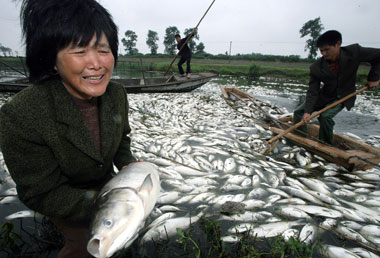China published on Monday a white paper on environmental protection, illustrating
the government's persistent efforts in this field in the past decade.
The white paper also says that the situation of environmental protection in
the country is still "grave".

A distressed family yesterday
take out dead fish from their pond in Xiaoshan District of Hangzhou,
capital of East China's Zhejiang Province. The fish were first found
floating on Friday afternoon, possibly due to pollution from a nearby
factory, according to Yin, the owner of the fishpond. Fish, shrimps, crabs
and tortoises weighing 50,000 kilograms were dead by yesterday, causing a
loss of 300,000 yuan (US$37,500), Yin said. The local environment
authorities are investigating the case.
[newsphoto] |
The 45-page white paper, the
second of its kind since 1996, is titled "Environmental Protection in China
(1996-2005)" and released by the Information Office of the State Council,
China's cabinet.
The white paper points out that since the late 1970s, China's economy has
developed rapidly and continuously. During the process, many environmental
problems that have haunted developed countries in different phases of their
100-year-long industrialization have occurred in China all at the same time.
The conflict between environment and development is becoming ever more
prominent. Relative shortage of resources, a fragile ecological environment and
insufficient environmental capacity are becoming critical problems hindering
China's development, it says.
The Chinese government has attached great importance to environmental
protection and set it as a basic national policy and sustainable development as
an important strategy.
Thanks to these efforts, although the amount of resource consumption and
pollutants is increasing greatly, the trend toward aggravated environmental
pollution and ecological destruction is slowing down, says the white paper.
Environmental pollution control in some river valleys has seen some positive
results, the environmental quality of some cities and regions has improved, the
amount of pollutant emission of industrial products has declined, and the
people's awareness of the importance of environmental protection has enhanced,
it elaborates.
The 17,000-word white paper briefs on China's
achievements in environmental protection legislation and system, prevention and
control of industrial pollution, pollution control in key regions, environmental
impact assessment, international cooperation in environmental protection and
some other related aspects.
According to the white paper, since 1996, the State has formulated or revised
major laws on environmental protection, such as those on prevention and control
of water pollution, marine environment protection, prevention and control of air
pollution, as well as evaluation of environmental impact.
The State Council has formulated or revised over 50 administrative
regulations to strengthen environmental protection.
Relevant departments of the State Council, local people's congresses and
local people's governments have, within the limit of their powers, formulated
and promulgated over 660 central and local rules and regulations in order to
implement the national laws and administrative regulations on environmental
protection.